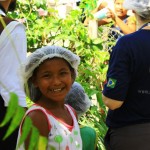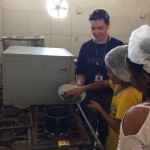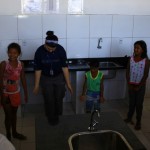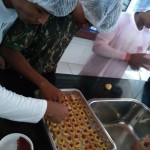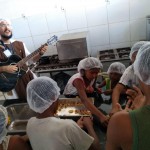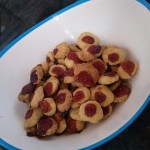In the month of January and part of February, monastics and missionaries of the Fraternidade – International Humanitarian Federation (FIHF), did a workshop to teach cooking in the Pintolândia shelter, in Boa Vista, Roraima. The idea emerged as an initiative for supporting children and young people to developed more interest and care when viewing the vegetable garden in the shelter.
The initial proposal was to make green juice and recipes based on plants, but first, there was a need to attract a group with more familiar ingredients to their taste, and then gradually introduce the greens. So, during the workshops, little biscuits of guava and lemon grass tea were prepared.
Each class was organized according to the age group and degree of interest of the children. The workshops started with the group meeting in the kitchen, in a circle; after the welcome, songs and canons were sung to create a more cheerful and interactive environment. The kids received guidance on proper hand washing and the importance of covering the head: basic hygiene principles when handling food.
While a volunteer of the team wrote down the recipe, each participant was neatly placing the ingredients in the bowl, and one of them mixed the dough with their hands, kneading it until it had the right consistency.
While the dough rested, everybody went to the shelter’s vegetable garden. There, gathered together in a circle, under the banana trees, they sang a rhythmic song about Nature. The kids were taught the medicinal and aromatic plants present there, feeling the texture, smelling the aroma, and learning about its benefits. They selected the tea that would accompany the biscuits, and harvested its leaves.
Back at the kitchen, after being shown the proper way to prepare the tea, the biscuits were shaped by everybody, finishing them up with a little piece of guava on top. After everything was ready, the children, who could no longer hide their eagerness, were finally invited to taste everything prepared.
Full of joy and contentment, they exchanged experiences on the recipes that they knew and appreciated, on Venezuelan crackers (water biscuits), and went over the recipe followed in the workshop, remembering it all in both Portuguese and Spanish. Before ending the activity, the team was split in order to tidy up the kitchen.
The missionary Viviane Leal felt that “the experience was very enriching, both for the teachers as well as the children that participated in it. We know that the kitchen is naturally a place for socializing and exchanges, and that it awakens happy feelings, sentiments and memories. The involvement and dedication of everyone was remarkable, and the moments of silence and peace were noticeable, flowing during the whole process.
If there was some material objective to be achieved, I would say it was indeed achieved but, above all, it is necessary to recognize what is not visible to the eyes and generates deeper and more permanent effects. These also were built into this simple experience, which can continue and be improved on.
We are grateful for the presence and participation of the Monastery and of the Missionaries Kátia and Lucía, who helped in this work, and also all those who gave their support to this task. We know that when we add our efforts together, we can go further.”

